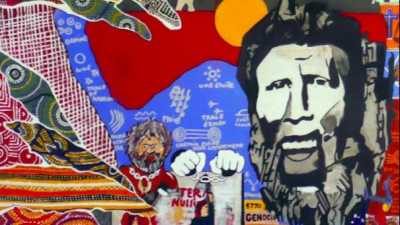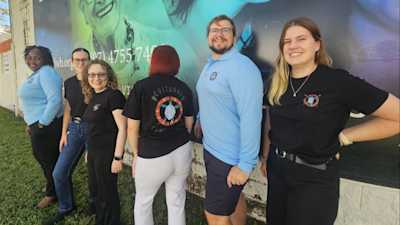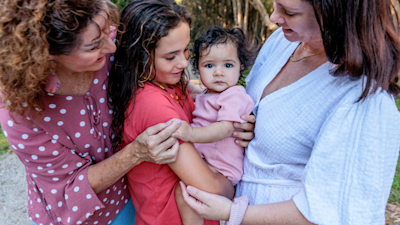Together, we can create a society that reflects the true diversity and strength of Australia.

Image: Three generations of Aboriginal women stand together outside.
In the tapestry of a nation's history, there are defining moments that shape its identity and pave the way for a better future. National Reconciliation Week is one such occasion in Australia, an annual observance that calls upon us to reflect, acknowledge, and unite as we strive towards healing and understanding. With deep roots in the history of National Sorry Day and the Uluru Statement, National Reconciliation Week stands as a powerful testament to the enduring spirit of reconciliation.
The Origins of National Sorry Day
National Sorry Day, held on May 26th each year, serves as a solemn reminder of the past injustices inflicted upon Australia's first peoples. It traces its origins to the momentous occasion on May 26, 1997, when the Bringing Them Home report was tabled in the Australian Parliament. This landmark document exposed the devastating impact of forced removals, commonly known as the Stolen Generations, on Aboriginal and Torres Strait Islander communities.

Image: A close up of Danielle wearing a black t-shirt, standing in front of a black background with half of her face in shadow. Next to her image is the National Reconciliation Week 2023 official artwork. On a light pink background, graphic text in red and blue reads: National Reconciliation Week 2023, 27 May - 3 June, Be a Voice for generations. The word 'Voice' is surrounded by a red block with a number of symbols in the negative space.
Learn about this year’s official artwork by Graphic Artist and Designer Danielle Leedie Gray here.
The Power of Reconciliation
Building on the foundation laid by National Sorry Day, National Reconciliation Week takes place from May 27th to June 3rd each year. This week-long commemoration signifies the ongoing journey towards reconciliation between Aboriginal and Torres Strait Islander communities and non-Indigenous Australians. It presents a unique opportunity to learn about and celebrate the rich cultural heritage of Aboriginal and Torres Strait Islander peoples.
Reconciliation is not just about acknowledging the past; it is also about working together to create a better future. It calls upon individuals, communities, organisations, and the government to foster mutual respect, understanding, and equality. National Reconciliation Week serves as a catalyst for dialogue, collaboration, and collective action in pursuit of social justice, recognition, and empowerment.
The Uluru Statement: A Vision for Reconciliation
The Uluru Statement from the Heart, a pivotal document in the quest for reconciliation, was delivered by Aboriginal and Torres Strait Islander leaders at the First Nations National Constitutional Convention in 2017. This historic statement presents a vision for a more inclusive and equitable Australia, rooted in a constitutionally enshrined First Nations voice and a process of truth-telling and treaty-making.
The Uluru Statement reflects the aspirations of Aboriginal and Torres Strait Islander peoples and their call for constitutional reform that acknowledges their unique place in the nation. It urges all Australians to listen, respect, and embrace the wisdom and knowledge of Aboriginal and Torres Strait Islander peoples, recognising that true reconciliation requires a genuine partnership based on trust and understanding.
One way we can do this is by learning about the upcoming Referendum. Establishing a First Nations Voice to Parliament commits our nation to recognising Aboriginal and Torres Strait Islander peoples, and committing to formal consultation on matters that directly affect them. Life Without Barriers supports a Voice to Parliament, as does our CEO, Claire Robbs.
“We are at an important juncture to make substantial and positive advancements."
"An enshrined Voice to Parliament will enable greater understanding of the policies and programs needed to support and empower Aboriginal people." Ms Robbs said.
Learn more about the referendum here.

Image: Four Aboriginal women are sitting on the ground working on the Uluru statement of the Heart. The earth is red and trees and Uluru can be seen behind them.
Moving Forward: Embracing Reconciliation
National Reconciliation Week provides an opportunity for us all to engage in meaningful conversations, learn from the past, and take proactive steps towards reconciliation. It encourages individuals and communities to participate in various events, discussions, and educational initiatives that foster greater awareness and empathy.
We can contribute to reconciliation by educating ourselves about the history, culture, and ongoing struggles faced by First Nations peoples. By amplifying Aboriginal and Torres Strait Islander community voices and supporting initiatives that promote cultural preservation and empowerment, we can help build a more inclusive and just society.
From its roots in National Sorry Day to the vision outlined in the Uluru Statement, this week serves as a powerful reminder of the ongoing commitment to right past wrongs and forge a future based on respect, equality, and partnership.
Let us embrace National Reconciliation Week as an opportunity to listen, learn, and engage with Aboriginal and Torres Strait Islander communities. By recognising the importance of their cultural heritage and wisdom and acknowledging the injustices of the past, we can build a nation that honours its shared history and embraces a future of reconciliation.
Life Without Barriers supports the Uluru Statement from the Heart in its entirety, and we support the establishment of a Voice to Parliament.


